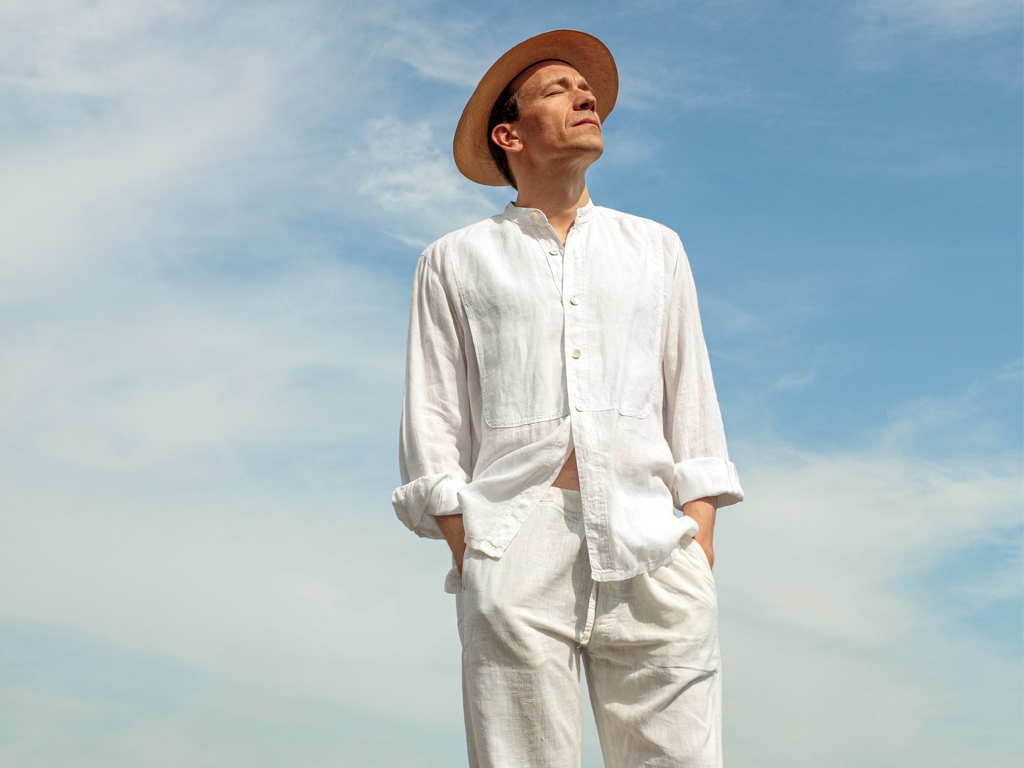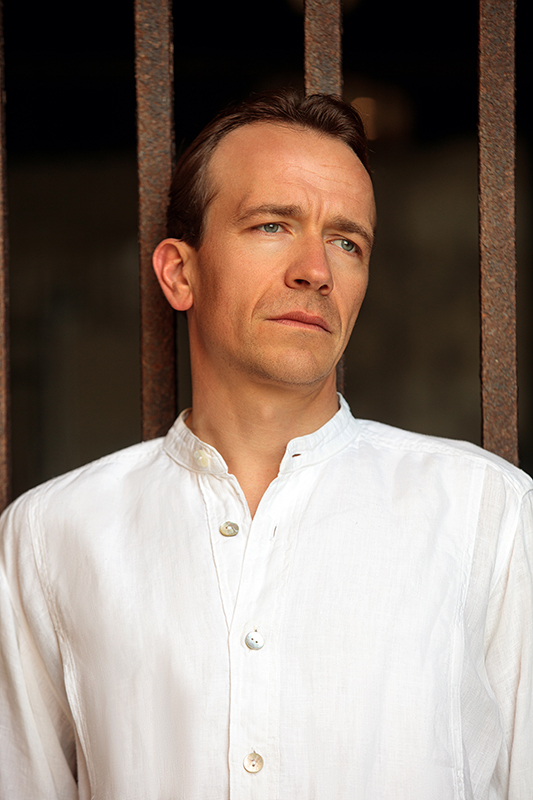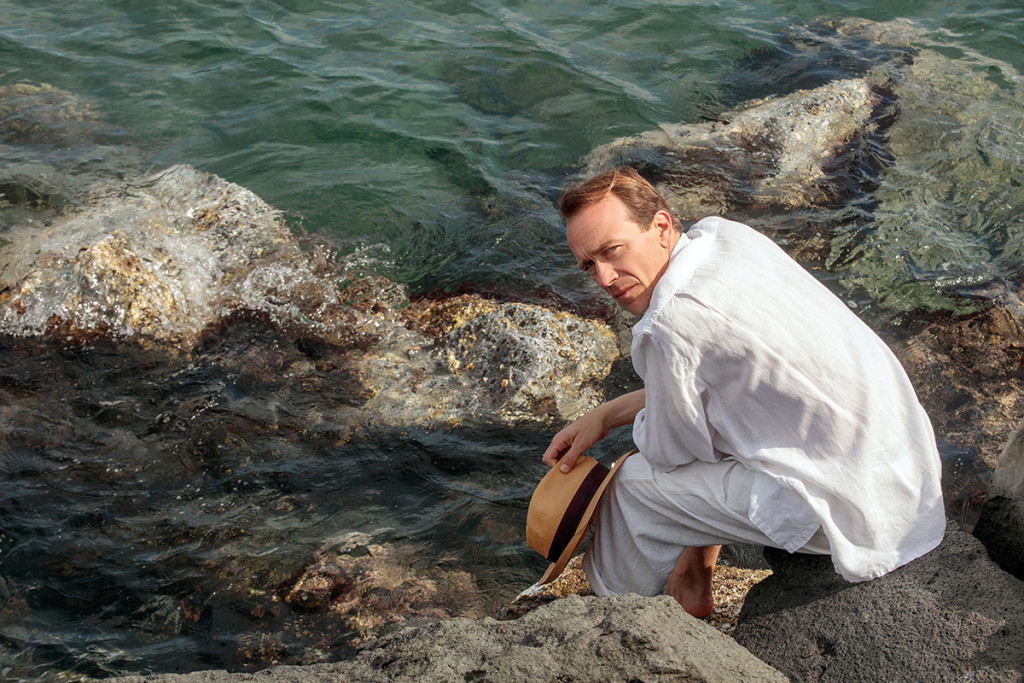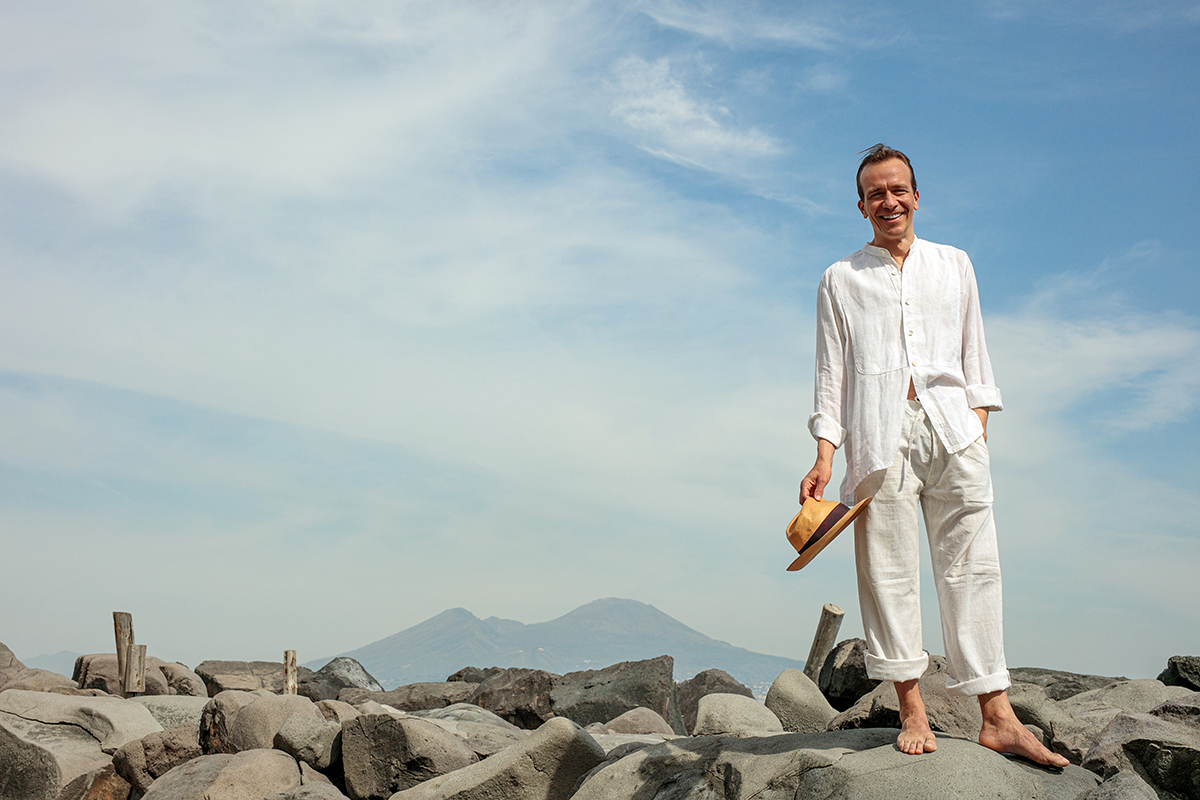
Lorenzo Gleijeses
Da Napoli a Napoli, dalle radici alle radici. Partire, tornare e riconoscersi. Come artista e come uomo
Intervista di Claudia Catalli | foto di Pepe Russo
 C’è chi approda al mondo dello spettacolo seguendo vie traverse, chi ci entra dall’ingresso principale e chi, semplicemente, ci si ritrova dentro. È il caso dell’attore napoletano Lorenzo Gleijeses, 41 anni di cui trentadue di carriera grazie al suo primo maestro, papà Geppy, allievo di Eduardo De Filippo, che lo mise in scena nel Liolà di Pirandello con la regia di Luigi Squarzina. I pregiudizi su di lui all’inizio erano forti: «Di me dicevano “vabbuò ma conosciamo già il padre, il figlio sarà la sua radice quadrata, una copia sbiadita”». Scatta automatica una reazione di rivalsa e la voglia di misurarsi con maestri di arte teatrale internazionali come Lindsay Kemp, Yoshi Oida, il Workcenter di Jerzy Grotowski. Solo dopo questo percorso di andata e ritorno alle radici gli sarà possibile costruire una carriera rispettata da tutti, che non rinnega il passato, né i legami di sangue. Proprio con suo padre Geppy, Lorenzo debutterà a settembre diretto da Ermanno Pugliese in Uomo e galantuomo, nella loro isola del cuore, Capri.
C’è chi approda al mondo dello spettacolo seguendo vie traverse, chi ci entra dall’ingresso principale e chi, semplicemente, ci si ritrova dentro. È il caso dell’attore napoletano Lorenzo Gleijeses, 41 anni di cui trentadue di carriera grazie al suo primo maestro, papà Geppy, allievo di Eduardo De Filippo, che lo mise in scena nel Liolà di Pirandello con la regia di Luigi Squarzina. I pregiudizi su di lui all’inizio erano forti: «Di me dicevano “vabbuò ma conosciamo già il padre, il figlio sarà la sua radice quadrata, una copia sbiadita”». Scatta automatica una reazione di rivalsa e la voglia di misurarsi con maestri di arte teatrale internazionali come Lindsay Kemp, Yoshi Oida, il Workcenter di Jerzy Grotowski. Solo dopo questo percorso di andata e ritorno alle radici gli sarà possibile costruire una carriera rispettata da tutti, che non rinnega il passato, né i legami di sangue. Proprio con suo padre Geppy, Lorenzo debutterà a settembre diretto da Ermanno Pugliese in Uomo e galantuomo, nella loro isola del cuore, Capri.
Partiamo da “Uomo e galantuomo”, chi interpreterà l’Uomo e chi il Galantuomo?
«La parte di Eduardo De Filippo è di mio padre, io farò quella che fu prima di Peppino e poi di Luca De Filippo. Tornare a lavorare con Geppy è un piacere, siamo uguali fisicamente ma molto diversi come approccio al mestiere».
La vostra reunion artistica si terrà a Capri. Che rapporto ha con questa isola?
«Capri resta uno dei posti più belli al mondo, con il tempo ho acquisito la capacità di comprenderla e amarla, da ragazzo avevo la possibilità di passarci molto tempo e mi sembrava una bellezza scontata, proprio perché familiare. Quando invece giri il mondo e fai confronti con altre isole capisci che Capri è davvero unica. Ricordo di aver vissuto un momento in cui non sopportavo il finto jet-set napoletano che si spostava in massa a Capri giusto per fare la passerella nei giorni di festa, e non per godersela, un fenomeno che mi dava la nausea. Facendo le vacanze lontano da Capri l’ho invece apprezzata di nuovo e ci sono tornato contento. Con la gioia di mio padre, che è sempre stato un grandissimo frequentatore dell’isola e mi ha sempre ripetuto “La bellezza di Capri è unica, ma va capita”».
Condividerebbe con noi un ricordo personale a Capri?
«Ne ho uno indelebile, la mia prima volta a Capri. Era l’8/8/88, per i cinesi la giornata più fortunata del secolo. Io e papà stavamo andando in barca alla Canzone del Mare con Lallo Sirignano. D’un tratto una moto d’acqua arriva verso di noi al massimo della velocità, ci viene addosso e fa un buco sulla prua della barca che inizia a girare su se stessa».
E lei?
«Mi tuffai in mare. I miei genitori si spaventarono molto, tutto sommato siamo stati fortunati: ne siamo usciti tutti illesi. Una prima volta memorabile».
Lei ha un legame viscerale con la sua città, Napoli. Anche quello è un lascito familiare?
«Napoli è il mio centro di gravità permanente. La città in cui sono nato e cresciuto fino a diciotto anni e da cui sono anche fuggito, perché stufo di rimanerci. Iniziai il mio percorso di formazione nel nord Italia e all’estero, da Bologna alla Danimarca, e a ventun anni, tre anni dopo la fuga, sono stato obbligato a tornare a Napoli perché mia madre non stava bene. Un ritorno forzato, non ne avevo voglia, mi godevo la mia indipendenza fuori. All’inizio mi è pesato, poi mi sono ricreato una vita qui, i primi spettacoli, lo spazio prove, i rapporti con i teatri e i festival, ho coltivato a Napoli la mia vita privata e personale rinnamorandomi da capo della città. Quando persi mia madre sentii che oramai era ridiventata il mio centro: più passava il tempo, più sviluppavo dipendenza per le meraviglie della città, per Posillipo, la Gaiola, il mare. Ho comunque continuato a lavorare anche fuori in tournée, ma la casa era Napoli e mi mancava, mi manca tuttora quando sono lontano. Oggi ci vivo con la mia compagna torinese e le nostre due figlie, Valeria e Costanza, di 6 anni e 18 mesi».
Anche loro figlie d’arte. Com’è stato per lei?
«Capivo che la catalogazione a figlio di papà era troppo semplice, per questo ho cercato un confronto con i maestri d’arte internazionali. Oggi credo che essere un figlio d’arte sia una benedizione e dia la possibilità di bruciare tutti sul tempo. Da ragazzo, invece, mi pesavano i giudizi di chi senza avermi visto recitare aveva già un’opinione su di me. Eppure se ci penso ho passato più tempo a lavorare che a fare tutto il resto. Il figlio di un banchiere, un impiegato o un avvocato, tra studi, università e il coraggio di dire alla famiglia che vuole fare teatro impiega anni, io sul palco ci sono cresciuto. Stimo molto chi fa teatro senza avere una famiglia di teatranti alle spalle, per la brillantezza d’animo di voler coronare il proprio sogno. Per me non è mai stato un sogno, era la realtà di tutti i giorni».
Che ricordi ha di quei primi tempi di palcoscenico?
«Mio padre mi faceva fare sul palco giochi di grande serietà con compagni di lavoro settantenni e super professionali. Da subito, per quanto fossi sereno e privo di terrorismi psicologici, mi sono reso conto che il teatro era un lavoro vero, richiedeva abnegazione, precisione, disciplina e sacrificio. Ho fatto cinque spettacoli con mio padre e Regina Bianchi prima dei 18 anni, mi davano ruoli importanti ma non avevo ancora deciso che sarebbe stata la mia professione».
Che cosa rappresenta oggi il teatro per lei?
«La mia vita, il mio interesse e il mio lavoro. Non so se da solo ci sarei arrivato, devo a mio padre l’occasione di recitare accanto ad assi del teatro italiano. Fatto sta che quando me ne sono allontanato e sono tornato facendo un teatro più sperimentale ho vinto anche il Premio Ubu (per Il figlio di Gertrude nel 2006) e percepito uno sguardo diverso su di me, come portatore finalmente della farina del mio sacco. A posteriori allontanarmi dalla lezione di mio padre è stato prezioso, ho avuto modo di fare il mio percorso fuori e poi tornare a lavorarci insieme».
Come prese suo padre la decisione di lasciare Napoli, allora?
«Non concepiva la mia voglia di tornare a fare l’allievo mentre già lavoravo con lui. Dopo tanti anni mi ha dato ragione, ha capito che mi sono creato una tavolozza di colori che lui non ha, tant’è che mi ha chiamato per Amadeus dove c’era bisogno di un lavoro più fisico, un attore che suonasse il pianoforte con i piedi ruotando sullo sgabello, per fare solo un esempio».
Altri suoi maestri?
«Lindsay Kemp, che conta tra i suoi allievi David Bowie e Antonio Banderas. Eugenio Barba, con cui lavoro da ventun anni e da tre portiamo in giro Una giornata qualunque del danzatore Gregorio Samsa, annoverato tra i dieci spettacoli imperdibili del 2021 in Europa».
Chi è Lorenzo fuori dal palcoscenico?
«Uno che non potrebbe mai vivere senza musica. Riveste un’importanza capitale nella mia vita. Mi rilasso con la musica, lavoro con la musica, ne ho bisogno sia quando vado in sala ad allenarmi, sia quando dirigo sessioni pedagogiche con gli allievi. Ascolto di tutto, sono cresciuto ascoltando Bob Marley, ho amato Pino Daniele e sono amico di Enzo Avitabile.
Mi piace la canzone tradizionale napoletana, come la musica elettronica, ho frequentato rave party in tutta Europa.
Due anni e mezzo fa ho fatto un lavoro su Mozart e sono rimasto folgorato dalla sua musica. Amo anche la musica indiana, alcuni autori africani, insomma sento musica a tutti i livelli, ricreativo e creativo. È parte integrante del mio quotidiano».
Ha lavorato al cinema con Mario Martone, Michele Placido, Marco Tullio Giordana e Matteo Rovere. Da chi le piacerebbe essere diretto?
«Paolo Sorrentino e Matteo Garrone in Italia, all’estero Jim Jarmusch. Tra i miei idoli cinematografici di sempre ci sono Stanley Kubrick e Andrej Tarkovskij».
Quali libri ha sul comodino?
«Quando abbiamo smesso di capire il mondo di Benjamìn Labatut. Non leggo molti romanzi, anche se amo la scrittura di Foster Wallace. Mi interessano soprattutto saggi di teatro, biografie, testi di sociologia, antropologia e filosofia da cui sono partiti molti miei lavori teatrali».
Un’ultima curiosità: da napoletano verace la immagino tifoso sfegatato del Napoli. Sbaglio?
«Assolutamente no, esco pazzo per il Napoli e, come tutti, il mio idolo è Maradona, genio che ha saputo fare gesti politici di uno spessore pari alla genialità che aveva come calciatore».
From Naples to Naples, from roots to roots. Leaving, returning, rediscovering himself. As an artist and a man
interview by Claudia Catalli • photos by Pepe Russo
There are some who approach the world of show business from the side streets, and some who go in through the main entrance, and then there are those who, quite simply, find themselves already inside. That’s how it was for Neapolitan actor Lorenzo Gleijeses, now aged 41, and with 32 years in the acting profession behind him. It was his first teacher, his father Geppy, a student of Eduardo De Filippo, who put him on stage for the first time in Liolà by Pirandello, directed by Luigi Squarzina. Initially he had to contend with some strong prejudices: “People said: ‘OK, but we already know the father, and the son will just be a copy, a pale imitation’.” That immediately triggered an ‘I’ll show you’ response, and the desire to prove himself through working with leading figures in international theatre, such as Lindsay Kemp, Yoshi Oida, and the Workcenter of Jerzy Grotowski. It was only through this path of leaving and then returning to his roots that it would be possible to build a career that would be respected by everyone, without repudiating the past or his blood ties. In September Lorenzo will be debuting with his father in Eduardo de Filippo’s Uomo e galantuomo (Man and Gentleman), directed by Ermanno Pugliese, on their favourite island: Capri.
Let’s start with “Man and Gentleman”: who is playing the Man and who the Gentleman?
“My father is playing the part of Eduardo De Filippo, while I’m playing the part that was first played by Peppino and then by Luca De Filippo. Working with Geppy again is a real pleasure: we’re very alike physically, but very different as regards our approach to our profession.”
Your artistic reunion is taking place on Capri. What is your relationship with the island?
“Capri is still one of the most beautiful places in the world, and over time I’ve acquired the ability to understand and to love the island; as a boy, I was able to spend a lot of time there and I took its beauty for granted, because it was so familiar. But when you travel around the world and compare it with other islands, you realise that Capri is truly unique. I remember a time when I couldn’t bear the fake Neapolitan jet-set that travelled to Capri en masse on festival days, not to enjoy the place but simply to show themselves off, which made me want to vomit. But having spent my holidays far away from Capri I’ve come to appreciate the place again and I was happy to come back here. To the joy of my father, who has always been a frequent visitor to the island and who has always told me: “The beauty of Capri is unique, but you have to understand it.”
Can you share a personal memory of Capri with us?
“I have one indelible memory: my first time on Capri. It was 08/08/88, which the Chinese believed to be the luckiest day of the century. My dad and I were on a boat heading for the Canzone del Mare with Lallo Sirignano. Suddenly, a Jet Ski came towards us at top speed, and collided with us, making a hole in the prow of the boat, which began to spin around.”
And what did you do?
“I dived into the sea. My parents were very scared, but all in all we were quite lucky, as we all ended up unhurt. It was a very memorable first time.”
You have a very deep bond with your city, Naples. Is that a family legacy too?
“Naples is my permanent centre of gravity. The city where I was born and grew up, until I was 18 years old when I escaped from it, because I was fed up with living there. I began my theatre training in the north of Italy and abroad, from Bologna to Denmark, and at twenty-one, three years after escaping, I had to return to Naples because my mother was ill. It was an enforced return: I didn’t want to go back, and I was enjoying my independence away from Naples. At first I found it hard, but then I created a life for myself here again: the first performances, the rehearsal space, the relationships with the theatres and festivals. I cultivated my private and personal life in Naples, and I fell in love with the city all over again. When I lost my mother, I felt that Naples had now become my centre again; the more time I spent there, the more I became addicted to the marvels of the city: Posillipo, the island of Gaiola, the sea. I continued to tour outside Naples too, but Naples was my home and I missed it; I still miss it when I’m away. Now I live there with my partner from Turin and our two daughters, Valeria and Costanza, who are 6 years and 18 months old.”
Like you, they were born into a theatrical family. How did you find that?
“I realised that it was too easy for me to be categorized as getting ahead simply because my father was in the business: that’s why I made a point of working with leading figures in international theatre. Now I think that being in a theatrical family was a blessing and offered the chance to do it all in record time. But when I was young, I found it hard to be judged by people who formed an opinion about me without ever having seen me perform. There again, I’ve spent more time working than anything else. For the son of a banker, an office worker or a lawyer, it takes years, what with studying, university and finding the courage to tell their families that they want to go into the theatre, whereas I grew up on the stage. I have a lot of respect for people who make a career in the theatre without having a theatrical family behind them, for their strength of mind in pursuing their dream. For me it was never a dream, it was everyday reality.”
What memories do you have of those first times on stage?
“My father had me perform in some very serious works on stage with co-actors in their seventies, who were ultra-professional. Although I remained quite calm and didn’t suffer any psychological terrors, I realised right from the beginning that the theatre was a proper job and demanded self-denial, precision, discipline and sacrifice. I performed in five shows with my father and Regina Bianchi before I was 18: they gave me important roles, but I hadn’t yet decided that I would make a career in the theatre.”
What does the theatre mean for you today?
“It’s my life, my hobby, my work. I don’t know if I would have succeeded by myself: I owe my father the opportunity I had to perform alongside stars of the Italian stage. But the fact is that when I went away, and then returned with a more experimental theatre, I won the Premio Ubu (Italy’s top theatrical award) for Il figlio di Gertrude in 2006, and I felt that people were looking at me differently, as though I was finally making my own way in life.
In retrospect it was a very valuable experience to distance myself a bit from my father’s example: I was able to make my own way away from home and then go back to work together with him.”
So how did your father react to your decision to leave Naples?
“He couldn’t understand my desire to go back to studying again when I was already working with him. After many years, he agreed I was right: he realised that I had created a palette of colours for myself that he didn’t have, and later he would call on me to perform in Amadeus where a more physical part was required, for an actor who could play the piano with his feet, spinning around on the piano stool, just to give an example.”
How about your other teachers?
“Lindsay Kemp, whose students included David Bowie and Antonio Banderas. Eugenio Barba, whom I worked with for twenty-one years. We have been touring with Una giornata qualunque del danzatore Gregorio Samsa for three years, which was named as one of the top ten shows not to be missed in Europe in 2021.”
What are you like when you aren’t performing?
“I’m someone who can’t live without music. Music has a crucial importance in my life. I relax with music, I work with music, I need it when I go to the exercise room for training and when I direct educational sessions with my students. I listen to everything: I grew up listening to Bob Marley, I loved Pino Daniele and I’m a friend of Enzo Avitabile. I like traditional Neapolitan songs as well as electronic music, and I’ve been to rave parties all over Europe. Two and a half years ago I worked on something about Mozart and I was really bowled over by his music. I also love Indian music and some African composers; so basically I listen to music at all levels, recreationally or creatively. It’s an integral part of my day.”
You’ve worked in the cinema with Mario Martone, Michele Placido, Marco Tullio Giordana and Matteo Rovere. Who would you like to be directed by?
“Paolo Sorrentino and Matteo Garrone in Italy, and Jim Jarmusch abroad. Stanley Kubrick and Andrei Tarkovsky are among my cinema idols of all time.”
What books do you have on your bedside table?
When we cease to understand the world by Benjamìn Labatut. I don’t read many novels, although I really like Foster Wallace. I’m mainly interested in essays on the theatre, biographies, and books about sociology, anthropology and philosophy which have given rise to many of my theatrical projects.”
One last question out of curiosity: as a true Neapolitan, I imagine that you are an ardent Napoli fan. Or am I wrong?
“No, you’re quite right. I’m crazy about Napoli and, like everyone else, my idol is Maradona: he was a genius and his political insight matched his brilliance as a player.”






